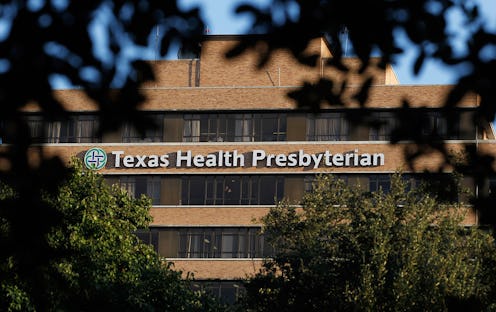News
The Ebola Patient's Hospital Has A Shaky Rep
As we've already seen with its initial handling of the U.S.'s first Ebola patient, the Texas Health Presbyterian Hospital in Dallas' competence may be a little questionable. And now there's new evidence that, alarmingly, supports that notion. According to a new Dallas Morning News report, the Texas Health Presbyterian Hospital Dallas has a history of prematurely discharging its patients, penalized more than any other North Texas hospital, and ranks below average for its emergency care conditions. These findings are not reassuring in light of Ebola's arrival to the U.S.
In 2012, Obama's Affordable Care Act introduced the Hospital Readmissions Reduction Program, which aims to reduce the number of readmissions (patients who get released by the hospital only to come back shortly because the issue was not resolved) at hospitals by financially penalizing facilities with higher rates of occurrences. In 2013 and 2014, the first two years of the program, the Texas Health Presbyterian Hospital Dallas, where America's first Ebola patient is currently being treated, topped the list of North Texas hospitals of similar size being penalized for readmissions. It also ranked in the top three of all hospitals in Texas being penalized. The federal government doles out its penalties by reducing the reimbursements hospitals receive from Medicare. The Dallas Morning News drew up a graph:
Even without the Ebola case, this report is worrisome, but knowing that the fate of a possible Ebola outbreak lies largely in the hospital's hands, it's downright panic-inducing. So how exactly could have Texas Health Presbyterian Hospital Dallas' reputation affected Duncan's case?
Less-Than-Ideal Emergency Room Conditions
Besides having a higher-than-average rate of patient readmissions, Texas Health Presbyterian Hospital Dallas also scored worse than the state and national averages in five out of six emergency care conditions. According to data from the U.S. Centers For Medicare & Medicaid Services obtained by the Dallas Morning News, the hospital's emergency room wait time was twice as long as the state and national averages.
The long wait times are an indication that either the hospital is understaffed or the system is inefficient, both scenarios that would contribute to patient errors.
How Duncan Was Released
Though Texas Health Resources, parent company of the Dallas facility, spokesperson Wendell Watson assured that the data has no relation to the Ebola case, the findings do align pretty closely with what happened with Duncan.
Last Friday, Duncan visited the hospital complaining of a fever, abdominal pains, decreased urination, and headaches. Since these symptoms didn't entirely match those typical to Ebola, the staff didn't automatically consider the possibility.However, Duncan did tell a nurse that he had recently traveled from West Africa, where the Ebola outbreak is rampant, but this very vital piece of information somehow got lost in the system. According to the hospital, "a flaw in the way the physician and nursing portions of our electronic health records (EHR) interacted" prevented Duncan's travel history from reaching the physicians. And as a result, he was sent home for two days before — you guessed it — being readmitted to the hospital and testing positive for Ebola.
Images: Dallas Morning News, Getty Images (2)
